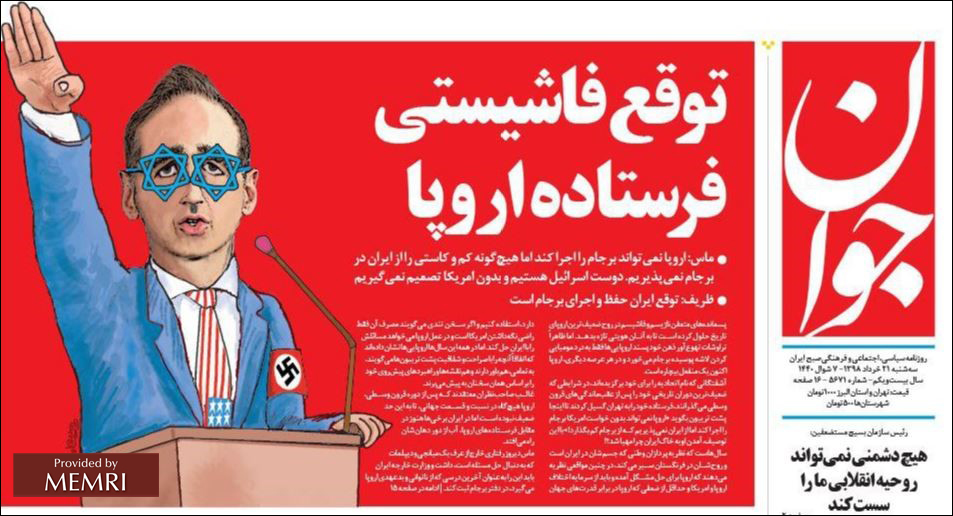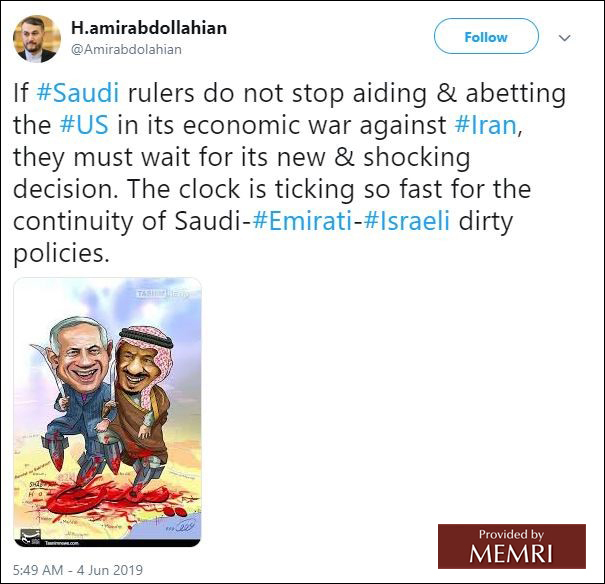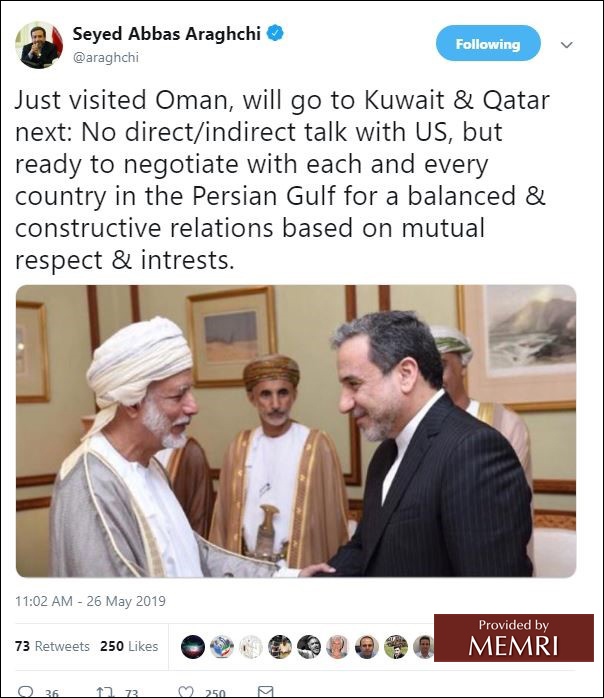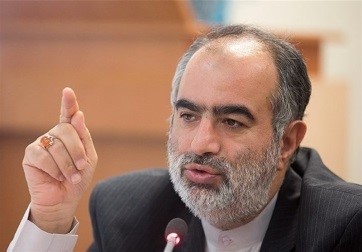Wprowadzenie
W zeszłym miesiącu Iran nasilił przemoc wobec państw Zatoki – Arabii Saudyjskiej i Zjednoczonych Emiratów Arabskich – w celu doprowadzenia USA do negocjacji na warunkach Iranu: pośredniczonych negocjacji, których celem jest zniesienie sankcji USA wobec Iranu. Dla USA cel negocjacji jest zupełnie inny; żądają zmian w umowie nuklearnej JCPOA i zatrzymania ekspansji i wywrotowej działalności Iranu w regionie, jak również ograniczenia rozwoju potencjału pocisków balistycznych Iranu.
Reakcja USA na militarną eskalację Iranu (patrz poniżej) była podwójna: Ameryka wysłała lotniskowce do regionu i postanowiła wzmocnić swoje siły w Zatoce, a równocześnie wyraziła gotowość do prowadzenia pośredniczonych negocjacji z Iranem i podjęła pojednawcze kroki, by to umożliwić. Te kroki obejmowały opóźnienie wpłynięcia lotniskowców do Zatoki Perskiej, opóźnienie wprowadzenia w życie sankcji na przemysł petrochemiczny Iranu i oznajmienie 2 czerwca 2019 r. przez sekretarza stanu Mike’s Pompeo, że USA są gotowe prowadzić negocjacje z Iranem bez warunków wstępnych, które ogłoszono wcześniej.
Negocjacje Iran-USA prowadzone przez pośredników podobno już się toczą, ale nie doprowadziły do niczego ani dla Iranu, ani dla USA z powodu niedającej się zasypać przepaści między żądaniami i celami stron.
Chociaż USA odrzuciły propozycję irańskiego ministra spraw zagranicznych, Dżawada Zarifa z 24 kwietnia 2019 r., by prowadzić negocjacje o wymianie więźniów, podobno jednak negocjowały i rezydent USA oraz libański obywatel, Nazar Zaka, przetrzymywany przez Iran od listopada 2015 r. pod zarzutem szpiegostwa, został zwolniony 11 czerwca 2019 r. Ponadto toczą się pośrednie negocjacje w sprawie ustalenia granicy morskiej między Izraelem a Libanem z udziałem Izraela i Hezbollahu, co wymaga pośredniego zaangażowania amerykańskiego i irańskiego.
Te pojednawcze kroki USA Iran przedstawił jako pokaz słabości. Irański prezydent, Hassan Rohani powiedział na konferencji sportowców w Teheranie 1 czerwca: „Ten sam wróg, który rok temu deklarował ‘moim celem jest zniszczenie reżimu Republiki Islamskiej [Iranu]’, ogłosił dzisiaj wyraźnie, że nie chce zrobić niczego przeciwko reżimowi [irańskiemu]. Ten sam wróg, który kilka miesięcy temu powiedział, że jest największą siłą militarną na świecie i że gdyby chciał, to mógłby złamać siły zbrojne Iranu, oświadczył dzisiaj, że nie ma zamiaru walczyć. Jeszcze kilka miesięcy temu Zatoka Perska była miejscem, gdzie jego lotniskowce pływały swobodnie, ale dzisiaj niczego nie słychać od jego marynarki i jest ona zakotwiczona na wodach międzynarodowych, 300 i 400 mil [od Zatoki Perskiej]. W tym czasie pokazaliśmy, że nie poddamy się straszącym i chciwym supermocarstwom. Jesteśmy ludźmi rozsądku i negocjacji, pod warunkiem, że siedzimy przy stole negocjacyjnym w pełni szanowani i w ramach międzynarodowego prawa, nie na rozkaz, by prowadzić negocjacje. W takim wypadku nie będziemy posłuszni…”[1]
Szef irańskiego sądownictwa, Ebrahim Raisi, powiedział 3 czerwca 2019 r.: „Widzimy jak Ameryka błaga o negocjacje z Iranem. To jest dalszy dowód poprawnego i przenikliwego stanowiska Przywódcy [Chameneiego], który mówił raz za razem: ‘W obliczu nadmiernych żądań wroga, opór jest jedynym sposobem dla narodu irańskiego, by osiągnąć zwycięstwo’. Dzisiaj Ameryka potrzebuje negocjacji i jeśli będziemy nalegać na nasze pryncypialne stanowisko, wróg cofnie się, jak faktycznie pokazały niedawne stanowiska oficjeli USA”[2].
2 czerwca 2019, generał Jahjah Safavi, doradca irańskiego najwyższego przywódcy, Alego Chameneiego i dowódca Korpusu Strażników Rewolucji Islamskiej Iranu (IRGC), powiedział: „Ameryka przechwala się tylko politycznie i militarnie, a w rzeczywistości dwa tygodnie temu zaczęła się wycofywać. Jesteśmy gotowi do wojny. Dzisiaj jesteśmy mocarstwem na Bliskim Wschodzie”[3].
Na tle przepaści nie do zasypania miedzy stanowiskami Iranu i USA i po niepowodzeniu rozmaitych kanałów pośredniczenia używanych przez Iran wobec USA (patrz poniżej), związana z IRGC gazeta „Javan” opublikowała 11 czerwca na pierwszej stronie karykaturę, przedstawiającą niemieckiego ministra spraw zagranicznych, Heiko Maasa, który niedawno odwiedził Teheran w próbie zbudowania mostu między stronami, jako Hitlera wykonującego rozkazy swoich amerykańskich i izraelskich panów. Takie przedstawienie wizyty Maasa odzwierciedla nikłe prawdopodobieństwo powodzenia pośrednich negocjacji, czy to o JCPOA, kwestiach ekspansji Iranu w regionie i jego pocisków, czy kontynuacji sankcji, a także wyraża frustrację irańskiego reżimu niepowodzeniem zmuszenia administracji Trumpa do zmiany stanowiska wobec Iranu.
 Karykatura na pierwszej stroni ”Javan”: „Faszystowskie oczekiwania europejskiego wysłannika” (Źródło: Javan, 11 czerwca 2019)
Karykatura na pierwszej stroni ”Javan”: „Faszystowskie oczekiwania europejskiego wysłannika” (Źródło: Javan, 11 czerwca 2019)
Wobec tego impasu oczekuje się, że Iran nasili swoją przemoc. Oznaki, że robi to, można zobaczyć w fali aktywności w różnych sektorach, włącznie z konfliktem Iran-Izrael na arenach Syrii i Gazy[4].
Oczekuje się także nasilenia konfliktu miedzy Iranem a państwami Zatoki, to jest Arabią Saudyjską i Zjednoczonymi Emiratami Arabskimi. 4 czerwca Amir Abirabdollahian, specjalny bliski współpracownik przewodniczącego Madżlisu, tweetował o Arabii Saudyjskiej:
„Jeśli #Saudyjscy władcy nie przestaną wspierać #US w ekonomicznej wojnie przeciwko #Iranowi, muszą poczekać na jego nową i szokującą decyzję. Zegar tyka tak szybko dla ciągłości Saudyjsko-#Emirackiej-#Izraelskiej brudnej polityki”.
 Twitter.com/Amirabdollahian, 4 czerwca 2019.
Twitter.com/Amirabdollahian, 4 czerwca 2019.
W artykule redakcyjnym z 22 maja 2019 r. związana z reżimem gazeta „Kayhan” wezwała do zniszczenia saudyjskiego reżimu[5]. Istotnie, milicja Huti nadal atakuje cele na ziemi saudyjskiej. 12 czerwca 2019 r. Hiti ogłosili, że zaatakowali pociskiem samosterującym dalekiego zasięgu cywilne lotnisko Abha, położone około 200 km od granicy jemeńsko-saudyjskiej; przedtem, 9 czerwca, zaatakowali dronami lotnisko Nadżran w południowozachodniej Arabii Saudyjskiej. Rzecznik Hutich, Jahjah Sari’a powiedział też 5 czerwca, że jego siły zaatakowały 20 placówek wzdłuż granicy saudyjskiej i przejęły je[6].
10 czerwca na wspólnej konferencji prasowej z niemieckim ministrem spraw zagranicznych, Maasem, na zakończenie wizyty Maasa w Teheranie, irański minister spraw zagranicznych, Zarif, ostrzegł: „Napięcie w naszym regionie jest z powodu ekonomicznej wojny Ameryki wobec Iranu. Jedynym sposobem zredukowania napięcia w regionie jest zastopowanie ekonomicznej wojny. Nie możecie oczekiwać, że ekonomiczna wojna z narodem irańskim będzie trwała, [podczas gdy] ludzie, którzy rozpoczęli ją lub ją popierają, są chronieni”[7].
12 czerwca zastępca Zarifa, Abbas Araghchi, także przekazał ostrzeżenie podczas spotkania z specjalnym wysłannikiem ministra spraw zagranicznych Singapuru, Zainula Abidin bin Mohamed Raszeeda. Powiedział: „Ameryka rozpoczęła ekonomiczną wojnę z Iranem i to jest źródło wzrostu napięcia w regionie. Amerykańskie sankcje ekonomiczne są w rzeczywistości skierowane przeciwko bezpieczeństwu całego regionu; dlatego niemożliwe jest oczekiwanie spokoju i bezpieczeństwa w regionie bez zawieszenia broni w [tej] ekonomicznej wojnie [przeciwko nam]”[8].
Dziś rano (13 czerwca 2019) eskalacja sięgnęła nowego szczytu z atakiem na dwa tankowce w pobliżu Cieśniny Ormuz[9].
[Ciąg dalszy tekstu nie jest spolszczony]
The Iran Condition For Negotiations: The Lifting Of The Sanctions
As noted above, in all its contacts with the U.S. since as early as 2015, the Iranian regime aims to get the sanctions on it lifted.[10] This was stressed most recently in statements by Iranian Supreme Leader Ali Khamenei on May 29, 2019 when he said: „The problem is [not the negotiations themselves but rather] setting the topic of the talks. We are not negotiating on every topic. I want to be clear: We will not negotiate on topics considered to be the honor of the revolution. We will not negotiate with anyone on our defensive capabilities. Because negotiation means a deal… not only sitting and talking… When they say [to us], 'give up and abandon the defensive options that strengthen you, it is impossible to negotiate on such a thing… This [is the essence of] negotiating with America; America’s strategy is pressure, and negotiation is only secondary to pressure.
„The way to fight this [American] stratagem… is for the other side [i.e. Iran] to have means of pressure as well, and utilize them. This is the only way… to stop the other side. We have the means of counter-pressure against the American pressure. These means are not military or anything like that, despite what they say and what they want to publicize. If a time comes when [military means] become necessary, we possess [such means], but this is not what we are considering [at the moment]. We have [other] means of pressure. The steps that the Supreme Council for National Security has taken and also announced [regarding the issues of uranium enrichment and heavy water] is one of them… That is, stopping [America’s pressure] is not limited [to the steps being carried out] at the moment. The current steps are sufficient for now, [but] in the next stage, when the need arises, we can use other means of pressure…”[11]
Addressing the cabinet on May 29, 2019 the occasion of Qods Day, Iranian President Rohani said: „[The Americans] talk a lot, and there are many ups and downs in their talk. The steadfastness of the [Iranian] people has occasionally forced them to contradict themselves. Our yardstick is not what they say but what they do. When they stop their injustice towards the Iranian nation, lift the cruel sanctions, keep their promises and return to the negotiation table – which they themselves left and destroyed – they will not find their way blocked. The Iranian nation is alert and clever, and its yardstick is action.”[12]
Iran’s Modus Operandi: Using Terror And Diplomacy Simultaneously
Iran’s usual mode of operation is to make simultaneous use of two means: its terror capabilities – which it calls „defense policy” (see Zarif’s statements in the ABC interview below), implemented either by its own forces or by its proxies in the Middle East – and its diplomatic capabilities, to achieve its aims and improve its political and regional standing. This policy of employing terror, directly or via proxies, in varying degrees of intensity in order to achieve diplomatic aims, is Iran’s regular strategy, as has been demonstrated again by the events of the past month in several arenas: in the UAE (the May 12 attack on the oil tankers), in Saudi Arabia (the May 12 Houthi attack on the Aramco oil facilities, as well as the May 26 Houthi attack on the aircraft hangars in Jizan on the Red Sea[13]), in Gaza (the activation of the Islamic Jihad to stage attacks on Israel on May 3, the day on which the U.S. retracted its exemption from sanctions for several countries still buying oil from Iran), and in Iraq (the May 19 firing of rockets at the Green Zone in Baghdad, which houses foreign embassies). Alongside its use of terror, Iran has proposed to negotiate a non-aggression pact with the Gulf states it has attacked. [14]
Both the terror and the diplomacy vis-à-vis the Gulf states are aimed at changing the policy of the U.S., which Iran is unable to confront directly. The goals of the terror attacks of the past month are the following: pressuring the U.S. to indirectly negotiate with Iran,[15] extracting an American commitment to refrain from attacking it, and securing the alleviation or lifting of the sanctions. The first two goals have in fact been achieved, but as for the sanctions, it seems that U.S. President Trump is unlikely to succumb to the Iranian pressure, and therefore Iran can be expected to renew its terror attacks, carried out by its proxies and targeting its Arab rivals and their global oil trade.
This strategy explains the repeated Iranian attempts to initiate negotiations with the U.S. on Iran’s own terms via various mediators – including Oman, Qatar, Iraq, Kuwait, Japan, Switzerland and Germany.[16] Foreign Minister Zarif visited Japan on May 17 and Baghdad on May 26, while his deputy Abbas Araghchi visited Oman and Kuwait and met with their respective foreign ministers.[17] Furthermore, German Foreign Minister Heiko Maas visited Tehran on June 10 and Japanese Prime Minister Abe Shinzo came there two days later to mediate and convey messages.
 May 26 tweet by Iranian Deputy Foreign Minister Abbas Araghchi (twitter.com/aragchi)
May 26 tweet by Iranian Deputy Foreign Minister Abbas Araghchi (twitter.com/aragchi)
Iran’s strategy was explicitly articulated by President Rohani’s advisor Hessameddin Ashna, who said on May 21: „We want [to achieve] two things simultaneously. First, we will not allow a war to break out in this region. Second, we will not agree to remain under [U.S.] sanctions. Our answer to the U.S. is 'no to war and no to sanctions.’ The U.S., which fears a war [with us], wants to force us to negotiate [with it]… The reply we gave [the Americans], and what our foreign policy [in the nuclear and diplomatic domains] and our defense strategy [a hint at the terror attacks attributed to Iran] accomplish, are the following: achieving a situation where America can neither frighten us with war nor maintain its sanctions [on us].”[18]
 Rohani advisor Hessameddin Ashna (source: Tasnim, Iran)
Rohani advisor Hessameddin Ashna (source: Tasnim, Iran)
Iranian Threats
Iranian officials complement the diplomatic pressure with harsh threats directed against the U.S. For example, Foreign Minister Zarif used threatening language in a June 2, 2019 interview with ABC: „We don’t differentiate between economic war and military war. The U.S. is engaged in war against us, and a war is painful to our participants. We have a very clear notion that in a war, nobody wins. In war, everybody loses the loss of some will be greater than the loss of others…
„’All options are on the table’ belongs to the time when the use of force was legal, and that is about 100 years ago. What we say is that we exercise our self-defense. Self-defense is allowed. President Trump has announced that he is engaged in a war and economic war against Iran, and we have an obligation to defend our people against that economic war.”[19]
Khamenei aide and advisor and former IRGC commander Yahya Safavi said on June 2: „The Americans have 25 military bases in the region, including the CENTCOM air command in Qatar, the ground forces command in Kuwait and the naval command in Bahrain. These bases house over 20,000 troops. The Americans know very well that this military force is in range of Iran’s missiles. Moreover, in the Persian Gulf, all of the American navy [vessels, and the vessels of other] foreign [countries], are within range of the IRGC’s surface-to-sea missiles. These missiles have a range of 300 km, i.e., can span the distance between the Iranian shore and the opposite shore.
„Trump has turned security into an economic [issue], and he will never launch any war unless it is economically profitable. Trump knows that any war against Iran will result in a military defeat [for the U.S.] and will also be very costly in economic terms. The very first bullet fired in the Persian Gulf will cause the price of oil to skyrocket to over $100 [a barrel], and America, Europe and America’s allies, such as Japan and South Korea, will not be able to bear oil prices of $100 [per barrel]…
„If Trump asks the opinion of the U.S. army [generals], who have learned the lessons of the Iraq and Afghanistan wars, they will certainly prevent him from fighting in Iran, for they know that Iran has a strategy of surprises and it will deliver a shocking blow [to the U.S.]. They know very well that Iran has kept many of its military strategies under wraps, and can deliver a shattering blow to foreign forces.
„The war being waged today is an economic and psychological one. The withdrawal from the nuclear agreement, and the oil sanctions, are actually [a kind of] war. I hope we will win this war as well, using the same strategy of resistance, soft war and internal unity.
„The strength of America, the Zionist regime and some of the Arab countries is steadily waning. The reactionary countries in the region [i.e., the Arab Gulf states] must know that the Americans have never been loyal to any of their slaves, such as the [Iranian] Shah, [Tunisian president] Zine El Abidine Ben Ali, [Egyptian president] Hosni Mubarak, [Libyan president] Mu’ammar Qaddafi, etc., and they will not be loyal to their slaves in the future. The Americans will definitely leave the Middle East, as Khamenei said…
„Iran will be the neighbor of the states in the region forever, and if they are wise, they will not capitulate to America, which calls them 'milk cows’ and extracts money from them.
„Iran always seeks to maintain friendly relations with the countries of the region, and Khamenei, too, has been stressing the unity of the Islamic nation for years. Our strategy is non-aggression towards our neighbors. Iran is even willing to sign a non-aggression pact with the neighboring countries. Foreign Minister [Zarif] mentioned this [only] recently. My suggestion is to sign a non-aggression pact with some of the countries and form a coalition with others. I hope that the countries of the region will regard America and the Zionists as their enemies, instead of Iran…”[20]
Responding to the dispatching of the USS Abraham Lincoln aircraft carrier to the Persian Gulf, IRGC navy commander Alireza Tangsiri said on May 13: „We are absolutely ready [for its arrival], and if the enemy missteps, our first move will be to attack and destroy all the American gear and infrastructures in the region.”[21]
* A. Savyon is director of MEMRI’s Iran Media Project; Y. Carmon is the president and founder of MEMRI.
[1] President.ir/fa, June 1, 2019.
[2] Mashreghnews.ir, June 3, 2019.
[3] Farsnews.com, June 2, 2019.
[4] A video released May 30, 2019 by the Palestinian Islamic Jihad’s Al-Quds Brigades showed drones attacking an Israeli tank. Saraya.ps.
[5] See MEMRI Special Dispatch No. 8082, Iranian Regime Mouthpiece 'Kayhan’ Announces A War To Bring Down Saudi Regime And Reduce Saudi Oil Exports To Zero; States: America Has No Desire, Or No Capability, To Support Saudi Arabia And The UAE, May 22, 2019).
[6] Almasirah.net, June 5, 2019.
[7] Tasnim (Iran), June 10, 2019.
[8] Isna.ir, June 12, 2019.
[9] Alarabiya.net, June 13, 2019.
[10] See MEMRI Special Dispatch No. 6151, Khamenei Declares That He Will Not Honor The Agreement If Sanctions Are Merely Suspended And Not Lifted, September 4, 2015; Inquiry & Analysis No. 1196, Iranian Supreme Leader Khamenei’s Letter Of Guidelines To President Rohani On JCPOA Sets Nine Conditions Nullifying Original Agreement Announced July 14, 2015, October 22, 2015; Special Dispatch No. 6191, Iranian Supreme Leader Khamenei, Iranian Officials Speak Out Against Iranian Approval Of JCPOA, October 18, 2015; MEMRI Daily Brief No.65, MEMRI: ’The Emperor Has No Clothes’, October 30, 2015.
[11] Farsi.khamenei.it, May 29, 2019.
[12] President.ir/fa, May 29, 2019. It is important to note that the Iranian regime does not rule out negotiations with the West, providing it can ensure compliance with its demands in advance. This is what happened during the Obama administration, when the Iranian regime announced it would not negotiate with the U.S. over its long-range missiles, but eventually did enter negotiations in which it demanded in advance, and received, American approval for missiles with a range of up to 2000 km. See MEMRI Special Dispatch No. 6100, Leaks From The Negotiation Room: Iran, Russia vs. U.S. In Verbal Clash Over Iran’s Ballistic Missiles, July 10, 2015.
[13] In late May the Houthi Al-Masirah channel also reported a Houthi suicide drone attack on Saudi military infrastructure. Fars (Iran), May 26, 2019.
[14] Iranian Foreign Minister Javad Zarif repeated this proposal to the Gulf states during his May 25, 2019 visit to Baghdad. ISNA (Iran), May 26, 2019.
[15] Iran refuses to hold direct and open negotiations with the U.S., since this is perceived as capitulation, based on the ideology of the Islamic Revolution (which regards the U.S. as the „Great Satan”) as well as from a political perspective. Secret and indirect negotiations are Iran’s customary solution in times of crisis. The open nuclear negotiations came only after lengthy secret contacts during which the Obama administration accepted Iran’s position in full, namely recognized Iran’s right to enrich uranium, which was an Iranian precondition for launching the open negotiations. See MEMRI Special Dispatch No.6131, Iranian Senior Officials Disclose Confidential Details From Nuclear Negotiations: Already In 2011 We Received Letter From U.S. Administration Recognizing Iran’s Right To Enrich Uranium, August 10, 2015.
[16] There have been numerous reports in the regional and global media about mediation efforts by countries inside and outside the region, including reports on a secret visit by Qatari Foreign Minister Muhammad Bin 'Abd Al-Rahman Aal Thani in Tehran in mid-May; willingness by Iraq and Kuwait to mediate between Iran and the U.S. in order to ease the tensions (Al-Hayat, London, May 27, 2019, arabi21.com, May 25, 2019, raialyoum.com, May 21, 2019, aljazeera.net, May 17, 2019), a visit by the Omani foreign minister in Tehran and contacts between him and the Americans (elaph.com, May 21, 2019), and a report by the Iraqi Almaalomah news agency on a visit by Iraqi Prime Minister 'Adel 'Abd Al-Mahdi in Qatar and Kuwait as part of the mediation efforts between Iran and the U.S. This last report also mentioned mediation efforts by Russia, Qatar, Iraq, Switzerland, Oman and Japan (almaalomah.com, May 20, 2019). The online daily raialyoum.com reported on May 26 that Zarif’s deputy Abbas Araghchi will relay a message to the Arab countries that Iran is interested in dialogue with them to resolve the problems, and also relay Iran’s replies to proposals presented by Qatar’s foreign minister during his visit to Tehran.
[17] Tasnim (Iran), May 26, 2019, ILNA (Iran), May 27, 2019.
[18] Tasnim (Iran), May 21, 2019.
[19] Abcnews.go.com, June 2, 2019.
[20] Fars (Iran), June 2, 2019.
[21] Fars (Iran), May 13, 2019.








